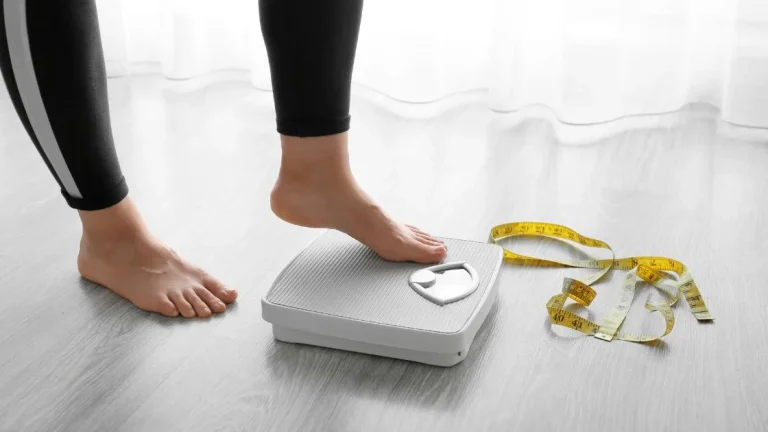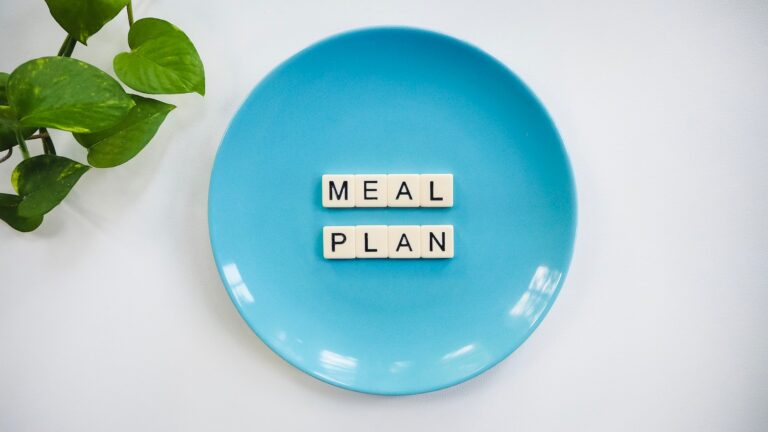If you think losing weight has just gotten harder and harder, then you’re not mistaken! Our bodies change considerably as we age. Unfortunately, these changes make it much, much harder to lose weight after fifty. But, don’t despair! There are many tips and tricks you can use to keep yourself slim, trim, and healthy. Read on to find out our 19 best ways to lose weight after 50!
Why is it Harder to Lose Weight After 50?
Our bodies change a lot through the course of our lives. You may think these changes are just external, but they reflect the internal changes our bodies are going through as well. Let’s check how your body changes when you get to your 50s.
- Hair & Skin – Collagen and elastin production slows down, leading to wrinkles and brittle hair.
- Hormones – Hormonal changes, especially during menopause, affect fat levels in the body, leading to increased levels of belly fat, among other differences.
- Muscles – Muscle mass diminishes, and it becomes more difficult to grow new muscles
- Heart Rate & Metabolism – Your heart rate slows down. A slower heart rate affects your metabolism, meaning you expend less energy at rest.
- Bones – Bones lose density and fracture more easily.
- Joints – Collagen and cartilage are replaced more slowly, leading to joint problems such as arthritis.
Now, these changes in your body alter every aspect of your life – from sleep quality to your social circle. It’s true. Things start getting different after the age of about 50.

Unfortunately, these changes also affect your ability to lose weight – and not for the better. Losing weight after 50 is challenging in more ways than one. Let’s check out how these changes affect your diet, exercise, and lifestyle.
DIET
A slower metabolism means that your body naturally needs fewer calories at rest. Those over 50 need to adjust their diet to reflect their calorific needs. This adjustment is essential for those following a sedentary lifestyle or who have stopped working and are expending less energy than before.
Like decreasing estrogen levels in the body, hormonal changes also affect your body’s cravings and lead to unhealthy eating patterns. While there are specialized diets for women over 50, eating a varied diet full of fresh fruits, vegetables, whole grains, lean protein, and healthy fats is vital.
EXERCISE
Due to a lower metabolic rate, exercise becomes even more critical than ever. However, especially if you are already overweight, fat loss over 50 is even more complicated. Your body is also less adept at growing muscles and has to work harder to conserve the muscle mass you already have.
This effect further complicates things as muscles aid the fat-burning process. Those experiencing difficulties with joint or bone health may have an even worse time, as exercise can be painful, and care is needed to avoid fractures and tears.
LIFESTYLE
A changing lifestyle exacerbates diet and exercise factors. Retirement, for instance, can drastically affect your fitness levels. Working is one way we do a lot of physical exercises every day, without even realizing it!
Add in more time at home with nothing between you and the fridge, and it’s a recipe for weight gain just waiting to happen! Even social habits typically decline as we age, further negatively affecting our weight as we spend more time at home.
How to Lose Weight After 50
So is it time to throw in the towel? Absolutely not! While it may be more challenging to lose weight after 50, no one said it was impossible! There are many small ways to change your diet, exercise habits, and lifestyle, which will help you stay slim and svelte no matter what age you are! Still don’t believe us? Here are 19 top tips for weight loss!
Ways to Lose Weight After 50
Move More
As we age, our lifestyle changes. Changes in sleep, and social and work patterns may leave you with a far more sedentary lifestyle than you have ever been used to. A sedentary lifestyle has multifaceted health effects. According to Mayo Clinic, a sedentary lifestyle can lead to more than just weight gain. Secondary effects include:
- Poor overall health
- Insulin resistance
- Heart disease and risk of stroke
- Certain types of cancer
So how do you fight against a sedentary lifestyle? The only option is to move more!
1. Avoid sitting for prolonged periods. Get up and go for a stretch at least every hour.
2. Try to schedule active social activities. Rather than sitting down for a coffee, organize walks or tours with your family and friends.
3. Don’t rely too much on convenience services! Try to do your grocery shopping rather than depending on delivery.
4. Join a class! A Pilates or resistance training class is an excellent way of getting a dose of regular physical activity into your week. Even an organization like Weight Watchers usually has some great weekly meetups. You’ll also meet other people looking to become more active!
Get Enough Sleep
We all know that sleep is essential, but did you know that getting enough shut-eye is also crucial if you are trying to get rid of some excess weight?
Studies show that not getting enough sleep actually reduces how much weight you can lose by 55%, even when consuming the same amount of calories and practicing the same amount of physical exercise.

Unfortunately, it goes even further than that! Lack of a good night’s rest also affects your hormone levels. It leads to overeating, increased fat gain, and irritability! Being awake late into the night can also increase your likelihood of late-night binge eating.
A good laugh and a long sleep are the best cures in the doctor’s book.
Irish proverb
So how much sleep do you need? While older adults tend to need less sleep than in their teenage days, the National Sleep Foundation recommends that healthy adults get in 7-9 hours of shut-eye every night. Those over 65 need slightly less and should aim for about 7-8 hours of quality sleep.
Do Not Skip Meals
When people are trying to lose weight, a standard tip among even health care specialists used to be skipping a meal like breakfast or dinner. These days, we all know better!
Skipping meals is actually counterproductive and can even lead to weight gain in the long term! The rationale makes sense if you don’t think about it too much. Skipping meals means avoiding a plateful of calories. Less food = less tummy fat, right?

Unfortunately, it doesn’t work quite like that in practice. Skipping meals and going too long without calories inevitably leads to a sudden hormonal change. This change then leads to your blood sugar dropping too low. When this happens, we inevitably get urges to snack. And snack on high sugar, fatty foods like chocolate and candy. This urge to eat is just your body trying to restore a normal balance!
Break the skip-binge cycle by filling up your plate at mealtimes. Choose nutritionally balanced, whole-grain meals full of fruits, vegetables, and lean protein. Better choices will keep your tummies content and snack attacks at bay. If you find yourself without appetite at mealtime or first thing in the morning, still try to eat a high protein, low calorie serving of something light like a yogurt or cottage cheese.
Hack the Commute
Think you don’t have time to exercise? Think again! One of the best ways of incorporating a little bit of movement into your daily routine is by leaving the car keys at home and walking or cycling to work or the grocery store.
If you live too far to walk, try parking your car at the end of the street where you will just have to walk an extra 5 minutes, each way, each day. Even just ten more minutes of exercise a day adds up to over an hour a week!
For people who live in the suburbs and must commute long distances to work, their wealth will sink as energy prices rise.
Robert Kiyosaki
Most health experts recommend a minimum of 150 minutes of moderate exercise, including brisk walking. Make the most of your time, and get in your daily steps by hacking the commute!
Buddy Up
Want to know one of the best ways to reach your weight loss goal? Find yourself a weight loss buddy! Having a friend in a similar situation is a fantastic way to build motivation and keep yourself committed to the healthy changes in your life. It’ll also help you curate a healthier lifestyle as you will be able to create healthy habits together!
Try joining Weight Watchers or a similar organization where you are likely to meet others trying to reach a healthy weight just like you!
Switch Up Snacks
After you hit about 50, your body needs fewer calories than it did before. This change means you won’t be able to eat the same diet you’ve been eating for the last 19 something years and expect your weight to stay the same. Instead, it’s time to switch things up, and a great place to start is your snacks. Even many so-called “healthy snacks” are full of saturated fat and empty calories. We recommend doing away with all the processed food altogether and keeping things natural.
Aim to consume natural snacks full of fruits, vegetables, lean protein, whole grains, and healthy fat. Try these snacks to keep you healthy and satisfied between meals:
- Crudites served with tzatziki
- Rice cakes with hummus
- A healthy smoothie
- Carrots with peanut butter
- Avocado on corn cakes
- Tuna and cucumber salad
Set Realistic Goals
Are you struggling to reach your weight loss goal? Maybe it’s time to reconsider those goals.
Unfortunately, it becomes much harder to lose weight after 50. This unfortunate truth means that even though you were once able to drop two dress sizes in a month, it doesn’t mean that is still a possibility – or even healthy to try.
Having goals to work towards is essential to keep your weight loss journey on track. However, these goals must be realistic and sustainable. Most experts agree that it is better to work slowly, making long-term changes when losing weight. Doing so is much more sustainable in the long run and less likely to lead to you putting all the weight back on again!
Most dieticians recommend that healthy women over fifty weight loss aim should be only about 1- 2 pounds a week. Your weight loss goal should ideally be something similar.
Lift Weights
Think lifting weights isn’t your thing? Think again! Regular strength training, also known as resistance training, is a great way to build and maintain muscle mass. Doing so is especially important as we age to fight against age-related degenerative muscle loss.
Having a higher muscle mass also speeds up your metabolism. So what does that mean? Increasing your metabolic rate simply means you will burn more calories at rest. Remember, more calories lost equals more fat burning!
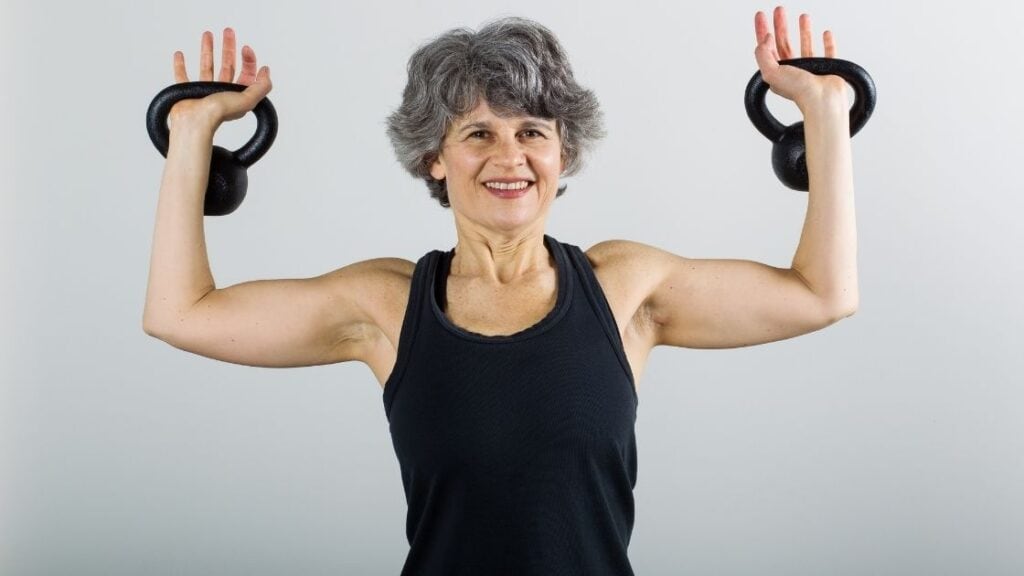
Lifting weights is also particularly beneficial for women as weight training helps calcium absorption and can aid in the fight against osteoporosis. It is also a relatively gentle exercise that doesn’t require a tremendous amount of time or money commitment.
Start small, with the smallest weights you can find, of about 1 – 2 pounds. You can also use a bottle of water or some heavy cans when just starting!
Use Fitness Technology
If your aim is fat loss over 50, then it’s well worth looking into the range of fitness technology they have on the market these days. Technology like Smartwatches and applications can help you track your workouts and follow a healthy diet. Let’s check out how smartwatches and applications can help you get rid of excess weight.
- Smartwatches
Smartwatches have extraordinary capabilities that will help you keep track of your fitness. They can measure your heart rate, physical activity, how many steps you take, the distance you travel – even how many calories you burn each day! Keeping note of this information is a great motivator and will help your fitness plan on track. It will also give you an insight into your exercise patterns and how this is reflected in your weight.
- Apps
You may also like to try downloading one of the many health apps on the market. From gentle pilates workouts to curated diets for women over 50, there’s a wide range of apps on the market to suit your fitness needs.
Pack in the Protein
If you want to reduce your body weight, one of the best things you can do is start eating much more protein. Lean protein contains all the essential components your body needs to grow muscle. It’ll also keep you full, which means you are much less likely to snack during the day.
Mayo Clinic recommends that women over 50 aim for a protein intake of 1- 1.5 grams of protein for each kilo of body weight.
So what are some delicious sources of lean protein you can use to help you reach your weight loss goal? Try eating more:
- Egg whites
- Plain greek yogurt
- Defatted peanut butter
- Tofu
- Turkey
Lower Stress
If you are struggling with losing excess weight, it may be time to consider your mental health. It is very common for weight gain to follow stress, as we may develop unhealthy coping mechanisms like binge eating junk foods. Periods of stress also leave us less time to care for ourselves, like practicing physical activity or healthy meal preparation.

While there is (unfortunately) no one magical way to wipe away all the stress from your life, you must spend some time locating the stressors in your life. Remember, awareness is the first step to controlling any problem! Check out some of our related articles for more information about lowering stress.
Fill Up on Fruits and Vegetables
They are the cornerstone to any healthy diet-the royalty of any healthy eating plan. That’s right; we’re talking about fresh fruits and vegetables. There are many different diets for women over fifty; however, all should include filling up on nature’s goodies.

Most healthcare specialists recommend that healthy adults consume about two servings of fruit and five servings of vegetables every day, with at least two of these being raw. We recommend snacking on even more veggies and fruits while trying to reach a healthy weight. Let’s check out why:
- Raw vegetables are super low in calories and make great grazing options. Remember, no one ever became overweight snacking on carrots or celery.
- Fruits and veggies are also full of both soluble and insoluble fiber. Being full of fiber means they will keep you satisfied all day long.
- Fresh produce is full of vitamins, minerals, and nutrients to promote a general sense of well-being and overall health.
- Fructose, the sugar in fruits, doesn’t spike your blood sugar in the same way that highly refined sugar does and is less likely to lead to insulin resistance, a precursor to diabetes.
Opt for Whole Grains
Want to know what goes great with all those fruits and veggies? Whole grains! Switching processed carbohydrates for their whole-grain counterparts is such an easy way that you can keep your body healthy fit and promote fat loss over 50.
Processed and refined carbs include white rice, white bread, and pasta. These are simple carbs, which break down and convert into sugar quite quickly.
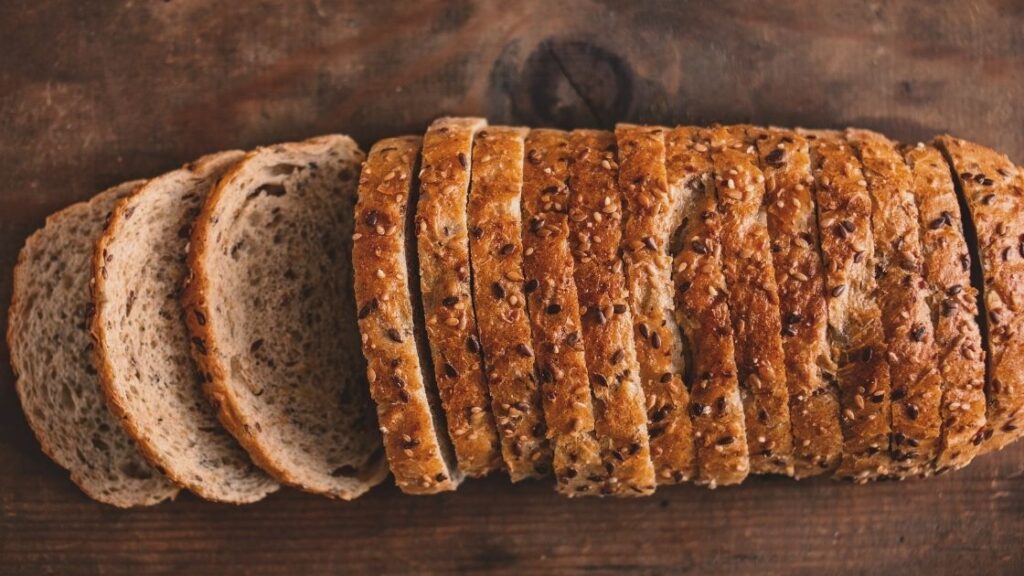
Whole grains take much, much longer to break down – which means you stay fuller and more satisfied for longer. Whole grains are also a much better source of fiber and other essential nutrients like B vitamins, iron, folate, potassium, and magnesium.
Think making the switch sounds hard? Try these recipe ideas!
- Switch white bread for wholemeal or rye.
- Are you making rice? Try brown rice instead, or get creative and experiment with different grains like bulghur or quinoa.
- Snack on oatcakes or whole-grain tortilla chips.
- Swap the high-calorie cereal for oatmeal or bran flakes
- Wholegrain pasta is an excellent option for a quick dinner.
Hire a Personal Trainer
If you have trouble finding exercises that suit your body, then a personal trainer can help. Personal trainers aren’t just for athletes! They are there to provide information about how you can make your workouts work for you.
Now, suppose you experience discomfort when working out, or your doctor has advised you to be cautious because of joint pain, osteoporosis, or any other issue. In that case, a personal trainer can structure an exercise plan just for you, taking your current health and capabilities into account.

A personal trainer will also be able to consider your aims. Whether you are looking for significant weight loss, gaining muscle mass, or simply maintaining a healthy weight, a personal trainer will create a routine just for you.
A personal trainer is also a great motivator and will help you with any questions or doubts. Even just a few weeks of sessions will set you up on the right track and provide you with a wealth of information. Remember, the best thing you can invest in is your health!
Take Up Yoga
Even if physical activity isn’t your thing, it’s essential to get your body moving with some regular exercise. You may like to try out a yoga class.
Yoga is a sport with many health benefits beyond just losing weight.
Sports medicine suggests that yoga can help:
- Improve bone density
- Build lean muscle
- Improve your overall health and wellbeing
- Reduce your risk of heart disease
- Support mental health
- Increase flexibility
- Disease control or prevention
- Balance hormone levels
- Reduce body fat
Just to name a few!
There are many yoga centers around these days, and most of them will offer a free trial class. What have you got to lose?
Eat Mindfully
Do you ever get to dinnertime and think to yourself, what did I even eat today? You may be a culprit for mindless snacking. Mindless eating is when you eat without focusing on what you are doing. It’s what we do when you open up a bag of chips while watching T.V. or somehow down a bar of chocolate while scrolling on your phone. And mindless eating is a fast way to rack up calories.
Ways to avoid mindless eating include:
- Turning off your phone at mealtime
- Eating in the living room or kitchen, rather than in front of the television
- Always put food on a plate or measure out portions before you eat
- Chew your food carefully before swallowing
- Make a meal plan the day before
- Up your protein intake to keep yourself feeling full
- Use smaller plates
- Avoiding processed food
Cut Out Sugary Drinks
Sugary drinks are the number one culprit for weight gain among Americans and can have devastating effects on your health. From heart disease to tooth decay, if you are still drinking sugary drinks, then it’s past time to stop. Sugary drinks may also lead to insulin resistance.
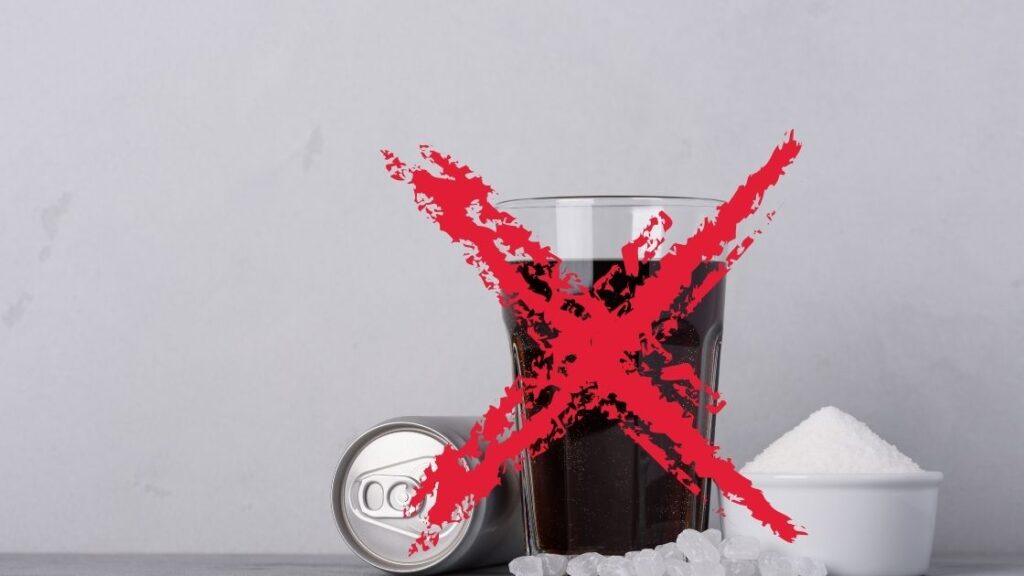
Remember, sugary drinks aren’t just things like soda or pop. You can find high amounts of sugar hidden in many types of beverages, including:
- Iced teas
- Iced coffees
- Specialty coffee
- Yogurt drinks
- Kombucha
- Fruit Juices
- Alcohol
- Sports drinks
Try to limit your sugary drink consumption or save them for special occasions like weekends. Look for artificially sweetened options with fewer calories wherever possible.
Eat Out Less
Not sure why you’re gaining weight? Have a look at what you are eating. While it’s easy to control the ingredients in your food at home, eating out is different. Even a seemingly healthy meal like a salad is often loaded full of fried croutons, creamy dressings, and a triple serving of cheese.
Add on a couple of glasses of wine, and you’ve got yourself a day’s worth of calories in a single meal. Restaurants cook using processed food and much less healthy methods than at home, emphasizing cost saving over health.
Eating out is undoubtedly a joy in life. However, If you are trying to reduce your calorie intake, try eating out only about once a week. You’ll save money too! Eating at home means you will be able to control – and keep track – of exactly what you are putting into your body. If you do go out, try to order a lean protein, like poached fish, where there are no hidden nasties to hide.
Get Tested
If you are following a regular exercise plan, eating healthily, and still struggling to lose weight, it may be worth talking to your doctor or dietician. Certain conditions, some associated with aging, can impede weight loss.

Special conditions include hypothyroidism and Polycystic Ovarian Syndrome; however, changes in your hormone levels can also be to blame. A doctor will perform tests and rule out any underlying conditions.
Final Verdict
It’s pretty clear our bodies go through a lot of changes as we age. Unfortunately, these changes can make it much more difficult to lose weight and make it much easier to gain fat! To help manage your weight, try incorporating these 19 tips into your diet plan, exercise routine, and as a part of your lifestyle choices.


